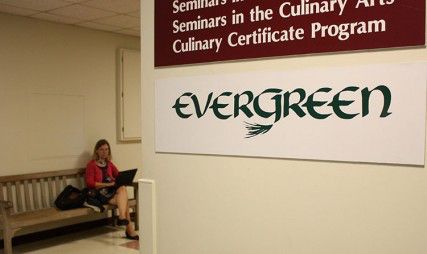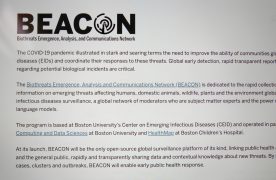Senior citizens hit the books with BU’s Evergreen program

Sitting in a lecture hall in the Kenmore Classroom Building, Neil Glazer listens to the professor discuss the fall of the Ottoman Empire on Tuesday and Thursday mornings. He is taking notes by hand, while the majority of the students in the classroom type on their laptops.
Neil is also taking a course on the Cold War on Wednesdays. He spends time doing his homework, catching up on assigned readings, and spending time with his friends and family — especially his three grandchildren.
With white, wavy hair and glasses, Glazer, a 74-year-old retired lawyer, commutes to Boston University during the week to attend his classes along with other students over the age of 58 who are part of the Metropolitan College’s Evergreen program.
The Evergreen program allows these mature students to audit a variety of classes alongside the undergraduate population at BU, as well as to attend individual lectures on campus to spark engaging discussions.
Hundreds of courses in many of the colleges are available to the students in the Evergreen program. They participate in classes and complete the readings just like the other students in the class, but they audit the courses since they are not seeking a degree, said Rebecca Alssid, the program’s director. Certain schools, such as the medical school and law school, do not offer courses for Evergreen members to take.
Age is the only requirement to be part of the Evergreen program. Evergreen does not require any specific educational credentials or professional affiliations, making the program accessible to everyone over the age of 58, Alssid said.
Participants of the Evergreen program also see benefits beyond the classroom. Alssid said that by offering lecture seminars to this age demographic in the Boston area, Evergreen students are able to keep their minds young and to stay up to date with current events.
The Evergreen lecture series begins on Oct. 23 with Best Short Stories with Taline Voskeritchian, Topics in Religious Studies with Anthony Petro, and Looking at Sculpture with Jonathan Ribner.
Birth of Evergreen
The Evergreen Program was founded in the 1980s under John Silber, former BU president. At the time, few dormitory options were available for students, and they were forced to live in the areas surrounding BU’s campus. The program was a way to give back to the older Boston community for housing the BU students, Alssid said.
Since the 1980s, the program has grown enormously and even attracts people from far beyond the Boston area. However, Alssid said one issue with the Evergreen program is that it does not attract much ethnic diversity.
“I was always hoping that we would have people from communities like the African-American community, the Chinese community or people from Jamaica Plain and the North End,” Alssid said. “I was hoping that they would come, but it’s been very hard to get people to leave those communities. It’s sort of a perfect program, but it needs to have more ethnicity.”
The program has changed little through the years because of the great turnout it has had and the reputation it has acquired over the years.
“If it isn’t broken, don’t fix it,” she said.
Today’s Program
The only major difference in the program today is the entrance age. Initially the entry age was 65, but Evergreen officials decided to drop the age limit to 58 since people have been retiring earlier in the past decade.
Today, participants of the Evergreen progam can be a sponsor or a student, depending on the fee paid. Classes and lectures are free to sponsors of the Evergreen Program, who contribute about $350 to the program each year.
Sponsors may take as many courses as they desire, and receive discounts on select seminars in food, wine and the arts, cooking courses and tastings, which are also hosted by MET. Those who do not choose to sponsor the program can pay $175 for an audited course, and about $10 for an individual lecture.
A Different Perspective
Driving approximately 25 miles from Framingham into Boston, Michal Leis has been taking classes with the Evergreen program for five years. This semester, he is taking his 10th class.
“As much as taking the classes, I enjoy watching how the professor teaches and how the students react from our view in the balcony, if you will,” Leis said.
With a different perspective compared to most undergraduates, who typically range from 18 to 22 years of age, Leis said he could relate to many of the professors who are his age.
“I also enjoy the ability essentially to become friendly with the professors simply because we’re age peers with a lot of them,” he said. “We get to know them as friends and not just [as] teacher and student.”
Herbert Mark, from Wellesley said he has always been interested in cultivating his mind.
“I’m not any better of a student now than I was when I was in college, but coming here stimulates me in my own studies,” he said.
The Comeback Kids
Born and raised in Boston, Martin Harrison graduated from BU with a bachelor’s degree in economics. After spending his career as a computer programmer and technical writer, he was excited by the idea of taking college classes again without the restrictions of choosing a major.
“In my case, I was an economics major,” Harrison said. “I had to take a required number of credits and I didn’t have time to take other courses, but I was interested in science, history and philosophy, and just couldn’t do it. Now the Evergreen Program has given me that chance.”
Joe Kebartas, also a Boston native, has been taking courses with the Evergreen program for five years.
“It’s a great way to get to know what the young people are thinking about,” he said.
Attending college in the 1960s, Kerbartas spent 36 years working as a psychiatric aid at McLean Hospital in Belmont.
“You can see the difference between going to college in the ‘60s and going to college now,” he said. “Back in the ‘60s, the students were much more political and students faced many problems, whereas now, students are much less active in political situations.”
Student Body Integration
Although there are similar programs at nearby colleges and universities, such as Harvard University and University of Massachusetts-Boston, many people choose BU’s Evergreen programs because of its seamless integration with young BU students, Alssid said.
“BU is unique in that it allows participants to attend the same classes as graduates and undergraduates,” Glazer said. “All of the others [universities] offer courses that are peer-taught … but at BU, we’re in contact with terrific people who are doing this for a living as opposed to amateurs. There’s a big difference in rigor and requirements.”
Here, people can join knowing that they are going to be treated like regular graduate and undergraduate students. No other program does it quite the same, she said. Each year, about 1,500 people get involved with Evergreen either by becoming sponsors or by taking individual classes.
Undergraduate students who have encountered the Evergreen students are supportive of the program.
“They just want to learn more,” said Michael Zhu, a College of Engineering junior.
“Learning for the sake of learning is something that we all do,” he said. “It’s a very human thing, and I think that it’s really great.”
Sometimes, the Evergreen students are able to share knowledge and perspective gained throughout their lives and careers with the class, which makes it a beneficial program for not only those in the program, but also for the students they take classes with, Alssid said.
Bruna Pino, a College of Arts and Sciences freshman, said she looks up to those who want to go back to school after so many years.
“I think it’s actually great that they want to take classes at that age and that they’re still interested in learning at that age,” she said. “Props to them.”
Glazer, who has taken more than 50 courses in the Evergreen program since his retirement in 2001, said he is always eager to learn more.
“I’ve only had a couple of classes I didn’t like,” Glazer said. “I’d say 95 percent of the courses I’ve taken have been enjoyable.”
Glazer said his interests have led him to take many courses in the international relations department, particularly those relating to China.
“I’ve unfortunately taken all the China courses, and I keep urging them to set up new ones,” he said.
In the meantime, he is taking other courses until more on the subject become available.
“I’ve just always enjoyed being a student,” the former lawyer said. “This is a very personal thing. I like information. I like to know things. This is just a wonderful way to spend my time. I can pick up The New York Times or The Economist and know what’s going on in the world.”
This is an account occasionally used by the Daily Free Press editors to post archived posts from previous iterations of the site or otherwise for special circumstance publications. See authorship info on the byline at the top of the page.













John Silber was no mere mortal, his BS detector was unmatched and he put his shoulder to the wheel with the Evergreen. He was way ahead of the curve on lifelong learning.